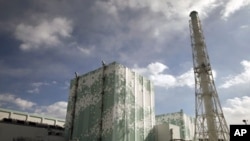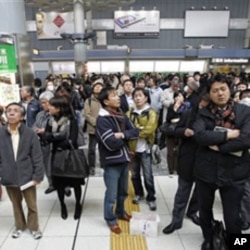Experts say there is a high likelihood of a big earthquake hitting the huge metropolis of Tokyo in the next few years. Authorities are trying to ensure the city is as prepared as possible for another large quake.
Earthquake alarms ring at Tokyo's Metropolitan Government headquarters, sending workers running for cover. Across the city, workers in another tower block react to a fire alert. It is part of a city-wide drill organized by the government last month.
Japanese scientists are warning the likelihood of a big quake striking Tokyo has increased since the huge temblor and tsunami last March in northern Japan.
Shinichi Sakai is from the Earthquake Research Institute at Tokyo University. He said, "When we did the calculations, tectonic activity was up by about six or seven times. At that point in time we established there was a 98 percent chance of a quake within 30 years,or for the next four years, it would likely be 70 percent."
Realistic animated models are being used to predict the potential fallout of a large quake on the city, the locations of weaker buildings, fire hazards, and evacuation bottlenecks.
Official estimates say a 7.3 magnitude quake in Tokyo could cause 11,000 casualties and destroy 850,000 buildings.
At Shimizu Corporation in Tokyo, scientists are working on cutting-edge construction technologies to protect against earthquakes.
One building is supported on hardened rubber dampeners. Other technologies include suspending buildings from a central pillar, which helps to absorb seismic shocks; and partially floating buildings on water which has been shown to reduce movement significantly.
A chief engineer at Shimizu, Masaaki Saruta, says Tokyo is better prepared than most cities.
"Recently-constructed buildings are strong enough to withstand a big earthquake. Even older buildings in Tokyo have been strengthened," said Saruta. "I won't say there will be no destruction at all, but we are prepared for this. It is still a work in progress. We need more buildings to include seismic isolation technology and older ones to be additionally strengthened. But Tokyo will not be annihilated."
Amateur footage posted online shows skyscrapers in Tokyo swaying alarmingly when the Tohoku earthquake struck last March. Saruta says it is part of the design.
"To be honest, I have never seen anything like that so I was really surprised as well," Saruta. "But basically you do not need to worry about a building even if it's swaying. What I mean is, you would expect a tall building to sway like that because of the design."
Last year’s quake, 300 kilometers to the north, shut down much of Tokyo, alerting authorities to prepare for a big earthquake even closer to this huge metropolis.





